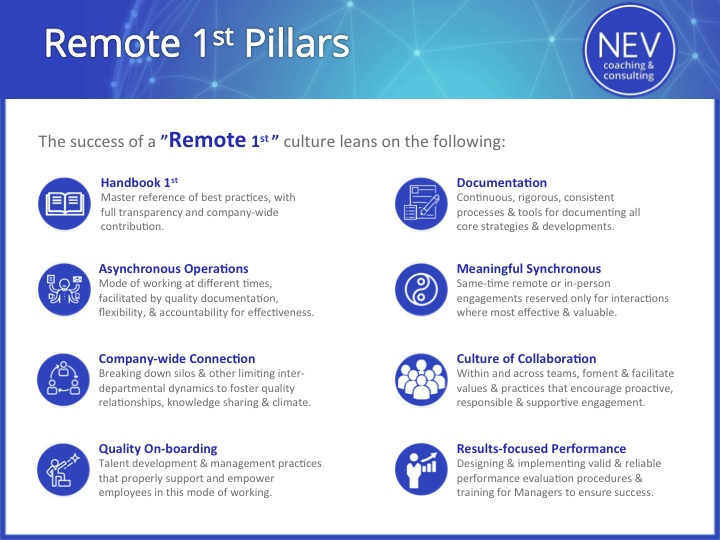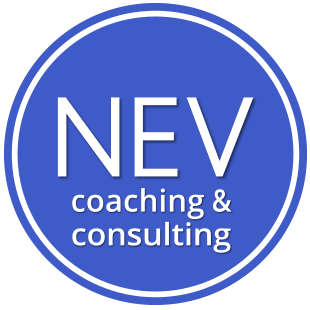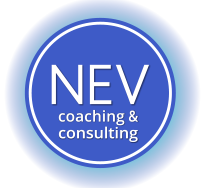 Remote Working? It’s on everyone’s mind. But how do we evolve intelligently towards such a trend for the long term…or even, a Remote 1st Culture?
Remote Working? It’s on everyone’s mind. But how do we evolve intelligently towards such a trend for the long term…or even, a Remote 1st Culture?
The recent ongoing pandemic deeply challenged our way of working, alone and with each other.
First, we kicked and screamed, with many struggling with remote working and the like. Only to come out the other side more than a year later, with most employees now desiring more flexible, remote working options.
Not desiring – even DEMANDING.
But how do you make the right choice for your organization?
Or yourself as an employee of one?
Because after the painful transition that was forced upon us, many also began to see the amazing BENEFITS of remote working:
- Comforts of working at home (once properly established).
- Deeper connection with Loved Ones.
- Better work-life balance.
- Savings in time and financial costs.
- The diverse costs of maintaining physical professional spaces.
- …not to mention the MASSIVE benefit to our precious environment.
It’s perhaps this last element, that is making it especially difficult for companies to insist on returning to the “old normal” of incessant commutes, air travel, face-time office presence, and the like.
With so little time left to us to reverse, the nearly irreversible damage we have done to our planet thus far, prioritizing the responsibility to protect our natural world is no longer a “nice-to-have” value in your company’s repertoire. It’s increasingly becoming a core ethic and “must-have” for the success of ALL future organizations.
Not to mention, a cornerstone of their competitiveness.
Young talent, the future leaders of our society, are seriously looking for this. As much for the ethical component it represents, as for the impact it would have on the quality of their work and personal lives.
What’s more, geopolitical institutions around the globe are mobilizing to ensure compliance with this fundamental priority.
So, if you and your organization are not yet thinking of ways to evolve your manner of working in this respect, you’re putting yourself at risk for significant damages:
1) Losing clients
2) Losing high-performing talent
3) Waning market competitiveness
4) Unnecessary costs that damage your sustainability
5) Not to mention potential legal repercussions
We, at NEV Coaching & Consulting, have gotten on this train already.
We are working with companies to support their change management efforts to evolve towards a “Remote 1st” organization or some hybrid appropriate to them.
Thanks to a beloved client, and his visionary ideas, this topic was made that much more real to us. To better understand the “inside experience” of how competitive organizations can make meaningful, even tiny shifts, that would MASSIVELY improve their internal and external success.
There’s much that’s involved in this kind of transition but again, intelligent small steps can be made with you and your team almost immediately.
It’s understandable that certain types of work do not lend themselves to this approach. But many do, at least in part. And exploring these options openly and strategically is one of the best things you can do for your team and company at this moment.
In this post, we’d like to cover the first key questions of what it means to work towards a Remote 1st culture and the best steps you can take to get started.
So what IS a “Remote 1st Culture”?
In short, it’s a way of working that promotes the possibility of allowing ALL employees to operate with greater flexibility and work-life balance. All this while optimizing the performance and overall effectiveness of the organization.
There are a number of core pillars of a successful Remote 1st culture, but the top 3 to first introduce here, are as follows:
1) Responsible & Accountable Business Documentation
The ENTIRE workforce participates in rigorously documenting all major business processes and outcomes for the shared learning benefit of ALL. To avoid repetition, waste in time and resources, and maximize the efficient and effective operation of everyone.
2) Asynchronous Communication with MEANINGFUL Synchronous Encounters
Routine, tactical operations (the majority) are executed in such a way that people connect in a timely and responsible manner around work objectives, BUT without having to always be together in meetings – remotely or in person.
This greatly depends on 1), as well as the ability to successfully manage your employees and teams around pre-determined, agreed upon, and well communicated and measured, key indicators of success (KPIs).
When topics become complex or sensitive, or direct communication adds TRUE value (like teambuilding!), synchronous (same time) engagements are scheduled and optimized that much more.
3) Culture of Non-Judgment & Collaboration
This means that QUESTIONS and doubts of all kinds are always welcome, as long as the employees do their due diligence. Proactively taking advantage of the growing shared knowledge and documentation of the company (see 1). And CONTRIBUTING to it.
They actively participate in taking responsibility, looking for solutions, supporting each other, and innovating towards better outcomes – for the benefit of ALL.
Here’s our more comprehensive summary of the keys to a successful Remote 1st organization:

If you’re thinking this isn’t possible, check out GitLab’s Remote PlayBook for great insights from a living, breathing and SUCCEEDING company, that is absolutely triumphing in this way.
So how do YOU get started towards the concept of Remote 1st?
Even if your company is not ready, struggling, or even not the “right fit” for this type of operation, you can definitely learn and create opportunities for small changes in this right.
Because let’s be honest here: it’s where the world is going, each day more, whether we like it or not. So don’t get left behind.
Here are some initial reflections to make (as a company leader or employee):
1) What are you gaining going remote? What are you losing?
Within your particular sector, circumstances, and vision of success, how does creating more flexibility, work-life balance and professionalism impact your day to day?
How will your team feel? How will YOU feel?
What operations need to stay in person or at least directly synchronous?
Which operations, when properly restructured and honed, can become asynchronous?
Be more strategic, open, and creative.
Success NEVER comes by doing the same thing all the time.
2) What is your ULTIMATE GOAL?
Connect with your PEOPLE. Connect with your NUMBERS and connect with your WAYS of WORKING, inside and out.
Once you have that clarity, understanding that the “world of working” IS changing, especially with the pandemic, how do you bring the two together?
There’s ALWAYS an answer. But if you insist on ignoring it, blocking it, or fighting it, your results will show for it.
Also, to help you reflect on the way the “world of working” is changing, see our previous NEVBlog “VUCA World. How to uplift and manage your Team and Business during Crisis”.
3) A Remote 1st Culture asks for what you already NEED and WANT
Here’s the crazy thing: ALL the things required to work TOWARDS some form of a Remote 1st culture, are the same things you’ve ALWAYS wanted for, and from your company:
- More commitment, responsibility and ownership from your Team.
- Talent development that is TRULY clear, coherent, fair, and motivating, so your people can continue to rise and grow.
- Business processes that are properly detailed and documented, in a unified way. And therefore EXECUTED, with greater success.
- Agility, efficiency and effectiveness in achieving your goals. As an organization and down to every beloved employee.
- A culture that fosters openness, kindness, creativity, sharing and collaboration in all of its daily operations, challenges and CELEBRATIONS!
I hear you. I know it may sound like a “Utopia”. It’s not.
There is a great proof of organizations around the globe that are already doing this – with SUCCESS.
Every new great innovation, every new positive change, will have MANY ups and downs, on the road to making it truly manageable, successful, and sustainable for the long term.
But we have two choices:
- Stay the same, kick and scream, and fight against progress (to our detriment).
- Or find INTELLIGENT ways to adapt, evolve and FLY.
Which do you choose?
The world is your oyster.
Don’t hesitate to reach out with your particular questions and ideas. That is what we love and are always SO HAPPY to connect with you.


